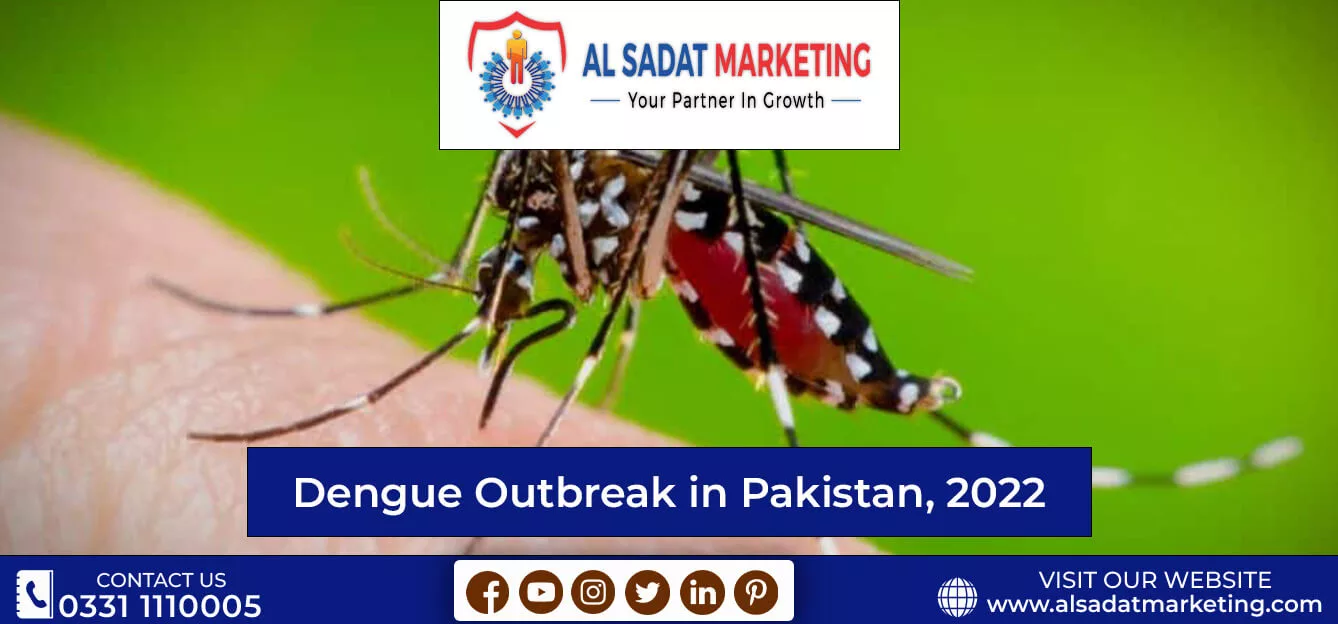Dengue Outbreak in Pakistan September 2022
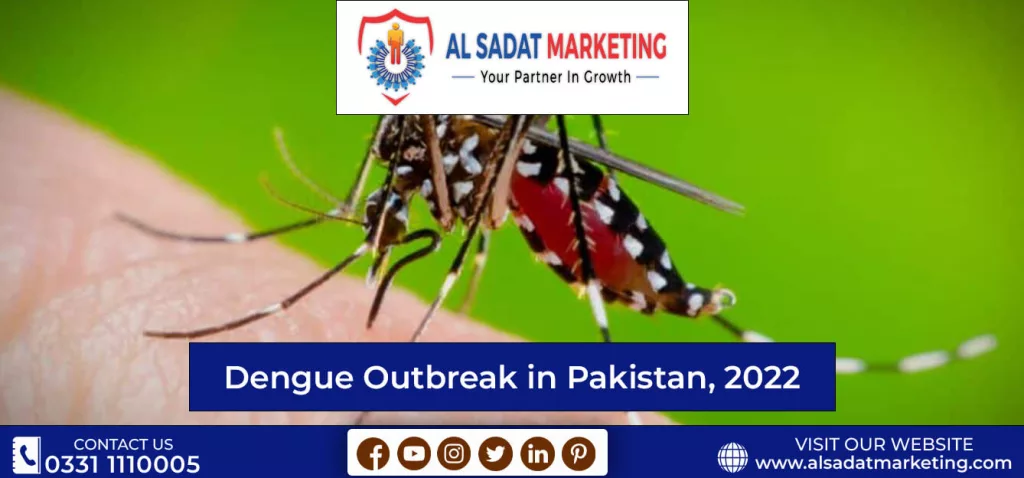
In Pakistan, dengue cases are still increasing. As of Wednesday, 165 cases of dengue have been reported in the twin towns of Islamabad and Rawalpindi in the previous 24 hours.
As many as 105 dengue cases were reported in the Federal Capital over the course of the last day, bringing the overall number of illnesses to 1,561, according to District Health Officer (DHO) Islamabad.
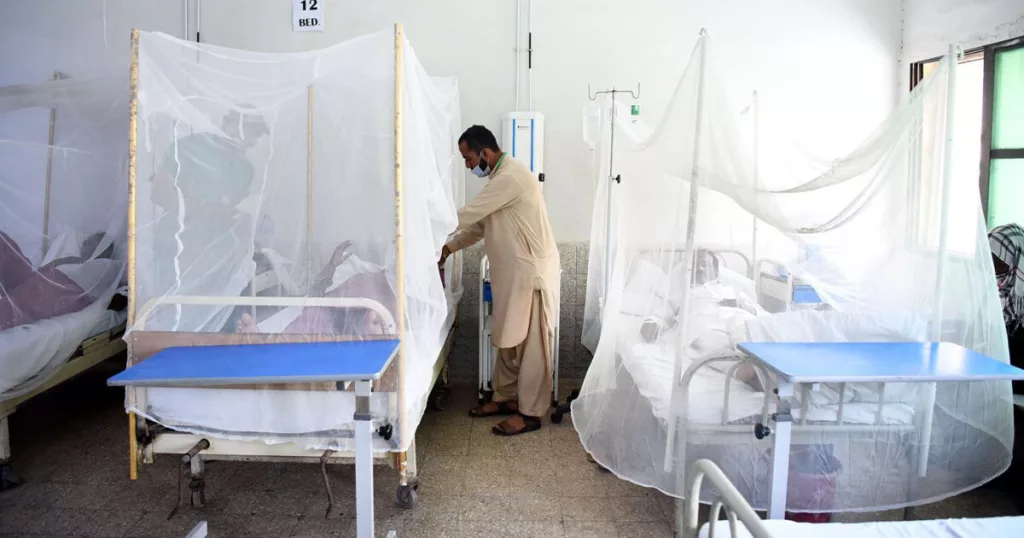
The DHO added that during the current monsoon season, five individuals have died from the dengue virus.
There have now been 1,463 confirmed cases of dengue worldwide, according to the Health Department, with 60 instances in Rawalpindi. According to the health authorities, two patients at Benazir Bhutto Hospital were in critical condition.
In Rawalpindi, the dengue virus has also claimed two lives. The health agency reported that steps were being taken by the government to stop the dengue outbreak.
Lahore is experiencing a significant increase in dengue cases; 100 new cases were reported in a single day, and dengue larvae were found in 764 different hotspots throughout the city.
In Karachi, the dengue virus is out of control; 248 instances have been registered in the past 24 hours, and 16 people have died in one day.
Dengue has been reported in the city in a total of 248 instances during the past 24 hours, affecting more than 3,285 residents, bringing the city’s total dengue cases this year to 5,492.
Given the rise in cases and fatalities, it appeared that dengue is more deadly than COVID.
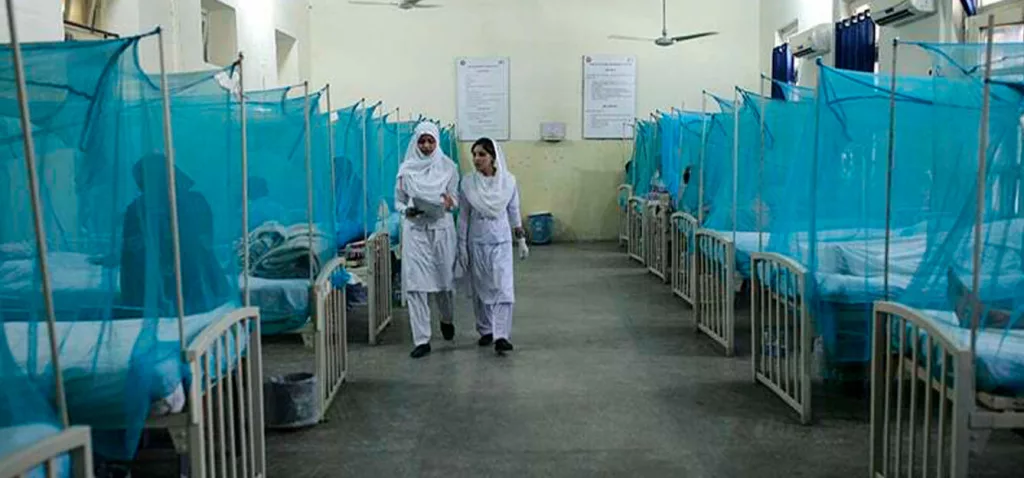
The Havoc of Flood Combined With Dengue
More than 33 million people have been displaced in Pakistan since mid-June by the worst floods in a decade. According to the National Disaster Management Authority, more than 1,500 people have died and more than 12,800 have been hurt.
Flooding had a particularly negative impact on Sindh and Balochistan’s southern provinces. Both states saw the wettest August on record, with seven and eight times their normal monthly rainfall, respectively. A study that was just released suggested that climate change may have increased the most severe rainfall by 50%.
Different water-borne and vector-borne diseases are spreading throughout Karachi as a result of the flooding in Sindh. Since 113 new dengue cases have appeared in several public and private hospitals in Karachi in the previous 24 hours, the situation there is quite concerning.
Additionally, according to official Sindh data, Sharqi district is the area most afflicted by dengue, with 66 cases reported, followed by Central District with 25, South District with 11, Korangi with 6, Malir with 2, and the West with 2.
Since the first of September, Karachi has seen a total of 843 dengue cases.
Causes of Dengue
Any one of the four dengue virus types can cause dengue fever. Being around someone who has dengue fever won’t cause you to catch it. In contrast, mosquito bites are how dengue disease is transmitted.
The two mosquito species that carry dengue viruses most frequently are widespread in and around residential areas. The dengue virus enters the mosquito when it bites a person who is afflicted with it. The virus then enters the bloodstream of the person who is bitten by the infected mosquito, resulting in an infection.
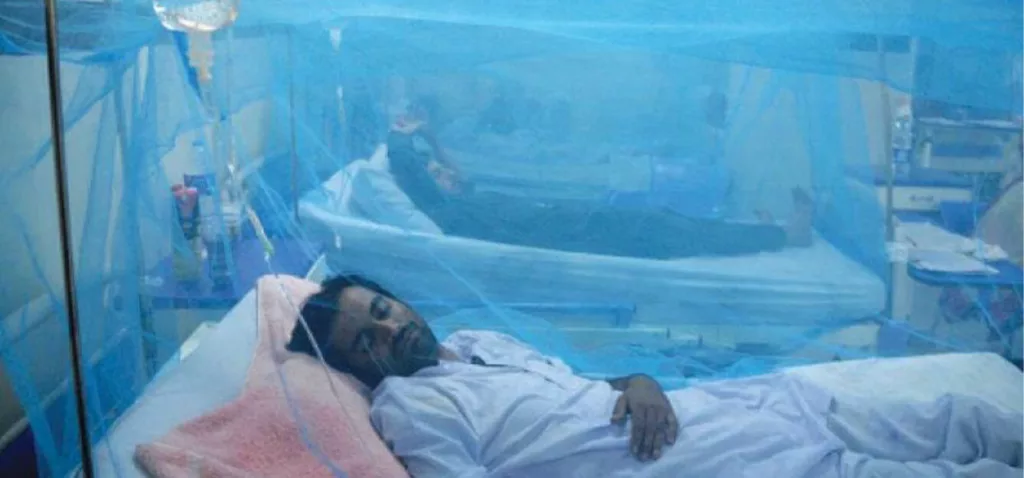
Once you have recovered from dengue fever, you are immune to the virus type that caused your infection for life, but not to the other three types that cause dengue fever. This implies that one of the other three virus types could infect you once more in the future. In the event that you contract dengue fever a second, third, or fourth time, your risk of acquiring severe dengue fever rises.
Dengue Symptoms
Many persons may not exhibit any symptoms or indicators of dengue illness.
When symptoms do show up, they typically start four to ten days after being bitten by an infected mosquito and may be mistaken for other ailments, like the flu.
Any of the following signs and symptoms, as well as a high fever of 104 F (40 C), are brought on by dengue fever:
- Headache
- Muscle, bone, or joint pain
- Nausea
- Vomiting
- Pain behind the eyes
- Swollen glands
- Rash
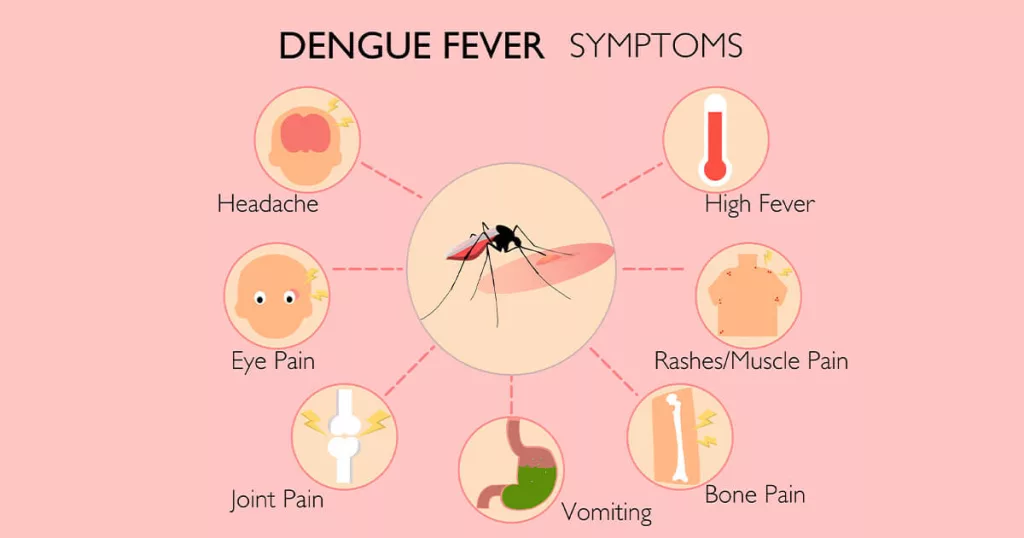
Most folks get better in about a week. In some situations, symptoms might get worse and even be fatal. Severe dengue, dengue hemorrhagic fever, or dengue shock syndrome are terms used to describe it.
Your blood vessels become damaged and leaky with severe dengue. Additionally, the quantity of platelets in your blood decreases. Shock, internal bleeding, organ failure, and even death may result from this.
There can be speedy development of severe dengue fever warning signs, which is a life-threatening emergency. The warning signals, which may include the following, may appear within the first day or two after your fever has subsided.
- Severe stomach pain
- Persistent vomiting
- Bleeding from your gums or nose
- Blood in your urine, stools, or vomit
- Bleeding under the skin, which might look like bruising
- Difficult or rapid breathing
- Fatigue
- Irritability or restlessness
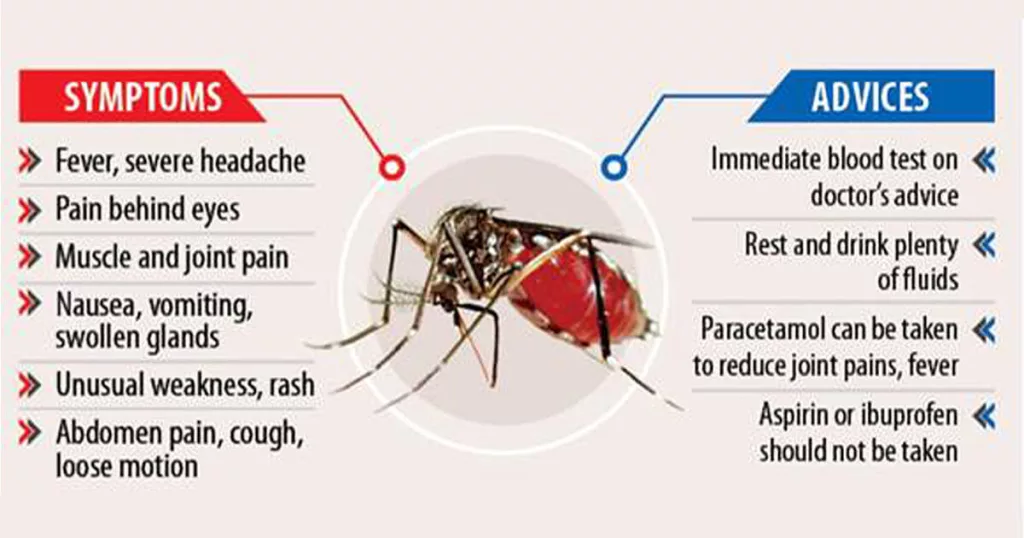
Severe Cases of Dengue
Internal bleeding and organ damage are potential effects of severe dengue infection. Shock can result from dangerously low blood pressure. Severe dengue illness occasionally results in fatalities.
Those who contract dengue fever while pregnant run the risk of passing the illness on to the unborn child. Additionally, kids of pregnant women who contract dengue fever are more likely to have preterm births, low birth weights, or fetal distress.
Prevention and Cure from Dengue Fever
Certain measures can be taken to prevent dengue fever.
Dengue Vaccine
One dengue fever vaccine (Dengvaxia) is authorized for use in regions of the world where dengue fever is prevalent in people aged 9 to 45 who have at least one prior case of dengue fever. Over the course of a year, there are three injections of the vaccination.
Only those with a history of dengue illness or seropositivity, a blood test that reveals a prior infection with one of the dengue viruses, are eligible for the vaccination. Receiving the vaccine appears to raise the chance of developing a severe case of dengue fever and being admitted to the hospital as a result of dengue fever in future seronegative individuals.
Prevent Mosquito Bites
The World Health Organization emphasizes that while the vaccination can help prevent dengue fever in regions where the virus is frequent, it is ineffective on its own. The major techniques for stopping the spread of dengue disease are avoiding mosquito bites and managing the mosquito population.
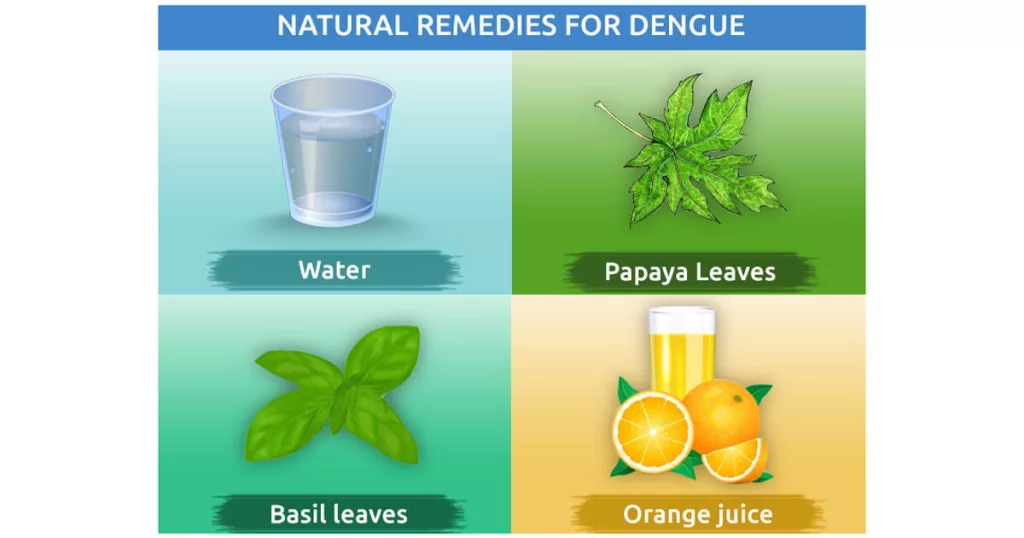
These recommendations may help lower your risk of mosquito bites if you reside in or visit a region where dengue fever is prevalent:
Try to Stay Indoors
Although they can bite at night, the dengue-carrying mosquitoes are most active between dawn and dark.
Wear Full Clothing
Put on safety gear. Wear long sleeves, long pants, socks, and shoes while entering mosquito-infested areas.
Use Mosquito Repellent
You can spray permethrin on your shoes, clothing, camping gear, and bed netting. Additionally, you can purchase clothing that already contains permethrin.
Reduce Mosquito Habitat
Usually found in and near homes, dengue-carrying mosquitoes develop in stagnant water that can accumulate in items like worn vehicle tires. By removing mosquito breeding grounds, you can contribute to a decrease in the number of insects. Empty and clean water-holding containers, such as flower vases, animal dishes, and planting pots, at least once each week. Cover any containers with standing water in between cleanings.
You can also invest in other famous and most in demand housing societies, such as , Blue World City, Rudn Enclave, 7 Wonders City Peshawar, Taj Residencia, Kingdom Valley, New Metro City Gujar Khan, Forest Town Rawalpindi, University Town Rawalpindi, ICHS Town, Park View City Islamabad, Multi Gardens B17 Islamabad and Nova City Islamabad.
Al Sadat Marketing please contact 0331 1110005 or visit https://alsadatmarketing.com/
Few more real estate housing schemes which are trending now a days in Islamabad by including: Faisal Town Phase 2, Prism Town Gujar Khan, New City Paradise, Eighteen Islamabad, 7 Wonders City Islamabad, Capital Smart City, Silver City Islamabad, The Life Residencia, Faisal Town Islamabad, Islamabad Golf City, Islamabad Model Town and Marble Arch Enclave.
Al Sadat Marketing is an emerging Real Estate Agency headquartered in Islamabad, Pakistan. With over 10+ Years of experience, Al Sadat Marketing is providing its services and dealing all trending housing societies projects in different cities of Pakistan. Islamabad Projects, Rawalpindi Projects, Gujar Khan Projects, Burhan Projects, and Peshawar Projects etc.
Book Your Plot Now: +92 331 111 0005


